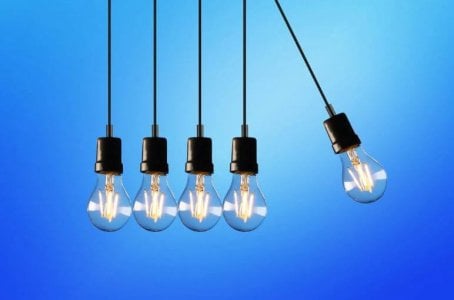Millions could receive up to $500 off their energy bills - find out if you're eligible!
- Replies 42
The rising cost of living coupled with growing energy bills may have everyone worried, but there is some good news on the horizon.
According to the latest announcement from the federal government, five million households and one million businesses could potentially receive up to $500 relief on their power bills through a $1.5 billion package included in the federal budget.
This means pensioners, small businesses, and people on government payments will be eligible for the subsidy. However, the amount they receive will depend on where they live.
The Albanese government has had to negotiate eight energy agreements with state and territory governments, so the size of the assistance could vary depending on the government in power and the current cost of living pressures in your part of the country.
Separately, the treasurer also announced that the budget would contain changes to the gas industry’s profit tax.
Mr Chalmers shared: ‘People will be getting several hundred dollars if they're on pensions and payments, or a small business, but depending on where you live, depending on what the price pressures are, depending on how much the states and territories are prepared to kick in because this is a co-investment with them.’
Shadow Treasurer Angus Taylor also mentioned that the test for the budget would be whether it could help alleviate pressures from inflation.
He said: ‘Everyone is being hurt by inflation — the whole lot of us...and so if you want to help all Australians, all vulnerable Australians, not just the ones you can identify and the ones you are picking out if you want to help all vulnerable Australians you've got to get the inflation under control.’
Mr Chalmers agreed and told reporters that the budget had been recalibrated and designed to ‘take pressure off the cost of living, rather than add to it’.
The treasurer also said that the budget would offer relief to vulnerable Australians ‘doing it tough’.
‘And central to that, probably the centrepiece of the budget will be a cost-of-living package which is broader than what has been speculated on, which prioritises the most vulnerable people and which applies to more than one age cohort,’ he told reporters.
He continued: ‘We’ve already announced cheaper medicines, cheaper early childhood education, help with energy bills, and there’ll be other elements to it as well.’
‘If there’s an opportunity to do better there, we will,’ he explained.
Treasurer Chalmers mentioned in his interview that a $2.4 billion increase in the Petroleum Resource Rent Tax (PRRT) could be seen over the next four years. These changes will follow months of negotiation with oil and gas companies starting July 1.
According to the treasurer, rather than allowing companies to fully deduct their project costs against income (which is what’s happening now), the deductions will be capped at 90 per cent.
‘Australians will get a fairer return on their resources sooner, and what this change means is about $2.4 billion in the forward estimates, which the gas companies wouldn't be paying, the offshore LNG projects wouldn't be paying, were it not for this change,’ Mr Chalmers told reporters.
What this entails is that more tax would come from these projects, and that means it could fund the government’s cost-of-living package and other priorities in the federal budget.
The PRRT was first introduced in the 1980s and has since been generating an average of $2 billion each year. However, it has long been criticised for providing ‘insufficient return’ to the country.
The leading lobby group for the industry, the Australian Petroleum Production & Exploration Association (APPEA), is believed to have supported the PRRT changes. They said they aimed to ‘get the balance right between the undeniable need for a strong gas sector’ that could support reliable electricity and domestic manufacturing for ‘decades to come’.
The group also said there was a need for sustainability in the national budget.
APPEA Chief Executive Samantha McCulloch told reporters: ‘PRRT revenues are already at their highest level ever, forecast to deliver revenue of more than $11 billion over the forward estimates.’
She also said that a ‘bipartisan approach’ was needed to provide investment certainty and called on the government to work ‘constructively and cooperatively’ with the opposition.
Mr Chalmers stated that the whole parliament should support the changes.
‘My message to the Greens in the Senate is if they vote against this, they're voting for lower taxes from these projects,’ he said.
The budget will also make room for increased funding for government and community services, including mental health, disability, domestic violence and homelessness services, the Medicare Benefits Schedule and community nursing.
This report comes after it was announced that the price relief would be applied directly to power bills as credits instead of cash handouts. This would be available to people who are on income support or pensions, recipients of the family tax benefit, and small businesses. You can read more details about this here.
 How do you make sure you save on your power bills? Are you looking forward to this bill relief? We’d love to hear from you in the comments below!
How do you make sure you save on your power bills? Are you looking forward to this bill relief? We’d love to hear from you in the comments below!
According to the latest announcement from the federal government, five million households and one million businesses could potentially receive up to $500 relief on their power bills through a $1.5 billion package included in the federal budget.
This means pensioners, small businesses, and people on government payments will be eligible for the subsidy. However, the amount they receive will depend on where they live.
The Albanese government has had to negotiate eight energy agreements with state and territory governments, so the size of the assistance could vary depending on the government in power and the current cost of living pressures in your part of the country.
Separately, the treasurer also announced that the budget would contain changes to the gas industry’s profit tax.
Mr Chalmers shared: ‘People will be getting several hundred dollars if they're on pensions and payments, or a small business, but depending on where you live, depending on what the price pressures are, depending on how much the states and territories are prepared to kick in because this is a co-investment with them.’
Shadow Treasurer Angus Taylor also mentioned that the test for the budget would be whether it could help alleviate pressures from inflation.
He said: ‘Everyone is being hurt by inflation — the whole lot of us...and so if you want to help all Australians, all vulnerable Australians, not just the ones you can identify and the ones you are picking out if you want to help all vulnerable Australians you've got to get the inflation under control.’
Mr Chalmers agreed and told reporters that the budget had been recalibrated and designed to ‘take pressure off the cost of living, rather than add to it’.
The treasurer also said that the budget would offer relief to vulnerable Australians ‘doing it tough’.
‘And central to that, probably the centrepiece of the budget will be a cost-of-living package which is broader than what has been speculated on, which prioritises the most vulnerable people and which applies to more than one age cohort,’ he told reporters.
He continued: ‘We’ve already announced cheaper medicines, cheaper early childhood education, help with energy bills, and there’ll be other elements to it as well.’
‘If there’s an opportunity to do better there, we will,’ he explained.
Treasurer Chalmers mentioned in his interview that a $2.4 billion increase in the Petroleum Resource Rent Tax (PRRT) could be seen over the next four years. These changes will follow months of negotiation with oil and gas companies starting July 1.
According to the treasurer, rather than allowing companies to fully deduct their project costs against income (which is what’s happening now), the deductions will be capped at 90 per cent.
‘Australians will get a fairer return on their resources sooner, and what this change means is about $2.4 billion in the forward estimates, which the gas companies wouldn't be paying, the offshore LNG projects wouldn't be paying, were it not for this change,’ Mr Chalmers told reporters.
What this entails is that more tax would come from these projects, and that means it could fund the government’s cost-of-living package and other priorities in the federal budget.
The PRRT was first introduced in the 1980s and has since been generating an average of $2 billion each year. However, it has long been criticised for providing ‘insufficient return’ to the country.
The leading lobby group for the industry, the Australian Petroleum Production & Exploration Association (APPEA), is believed to have supported the PRRT changes. They said they aimed to ‘get the balance right between the undeniable need for a strong gas sector’ that could support reliable electricity and domestic manufacturing for ‘decades to come’.
The group also said there was a need for sustainability in the national budget.
APPEA Chief Executive Samantha McCulloch told reporters: ‘PRRT revenues are already at their highest level ever, forecast to deliver revenue of more than $11 billion over the forward estimates.’
She also said that a ‘bipartisan approach’ was needed to provide investment certainty and called on the government to work ‘constructively and cooperatively’ with the opposition.
Mr Chalmers stated that the whole parliament should support the changes.
‘My message to the Greens in the Senate is if they vote against this, they're voting for lower taxes from these projects,’ he said.
The budget will also make room for increased funding for government and community services, including mental health, disability, domestic violence and homelessness services, the Medicare Benefits Schedule and community nursing.
This report comes after it was announced that the price relief would be applied directly to power bills as credits instead of cash handouts. This would be available to people who are on income support or pensions, recipients of the family tax benefit, and small businesses. You can read more details about this here.
Key Takeaways
- Five million households and one million businesses will receive up to $500 relief on their power bills under a $1.5 billion package in the federal budget.
- Treasurer Jim Chalmers confirmed a $2.4 billion increase in Petroleum Resource Rent Tax over the next four years.
- The budget will also increase indexation for funding for government and community services, including mental health, disability, domestic violence and homelessness services, the Medicare Benefits Schedule and community nursing.









